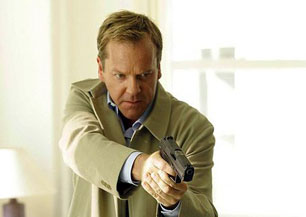|
|
Mythology: 24 FinaleBy Martin FelipeJune 30, 2010
The first season also introduces a 24 staple which, at the time was devastating, but which the writers would go on to overuse (spoilers). At the end of the first day, despite all of his heroic efforts, Jack fails to stop traitor Nina from killing his wife Teri. It's so difficult to create emotional arcs in a story that takes place within such a short span of time as a day. The fact that they are able to do so in the first season is a testament to the writers. But as bodies begin to pile up in subsequent days, the emotional resonance of the deaths start to lose their sting. Some of the eventual deaths are of longer running characters, and these deaths hold some weight, but as the revolving 24 cast door continues to spin, we realize that, except for Jack (and probably Chloe), no one is safe from the chopping block. For that matter, newer expendable characters (Bill and Renee spring to mind) are less developed, some don't even have one note to stand on. I've always maintained that character is the most important thing in storytelling. When dull characters start to die off, I don't really care. For that matter, as Jack's long days go on, he becomes more and more of a goal-oriented shark. This at least makes him a compelling character, but his relationships with the others suffer. I remember in particular how moved I was in the first season when Jack says goodbye to his daughter Kim as he flies to what he thinks is his death. By the time we get to the final eighth season, his emotional connection to Renee and her death seems so perfunctory, such a device to motivate Jack throughout the final arc, that there is no cathartic payoff to his final round of reactionary badassery. I'll hand it to the writers, they do make an admirable attempt at ending the show with some emotional payoff between Jack and Chloe, but the problem is, as awesome a fan favorite as Chloe has become, their relationship always seems goal-oriented. Jack likes and respects her, but, more than anything, she's just a means to an end for him. Maybe day after day of betrayal and death has taken its toll on him. How could it not? I guess I can't really blame him for his withdrawal, but it makes for an unsatisfying resolution. And that's what really gets to me. How can a moment between the two best characters on 24 make for such a hollow finish? It saddens me; it really does. 24 is such a great show for so much of its run, but the last three days not only fail to live up to the standards of the previous five, but they also retroactively tarnish them. The weaknesses of late 24 serve to highlight the more hidden weaknesses of early 24. The lesson, of course, is art over commerce. Don't take me for an idealistic naif, I'm aware that shows live on through their profit, and those funding them don't want to end the money train, even if it means the show going out with a whimper. I'm aware of this, and I lament it. Okay, enough whining. Bring on the 24 movie!
|

|
|
|

|
Friday, November 1, 2024
© 2024 Box Office Prophets, a division of One Of Us, Inc.


